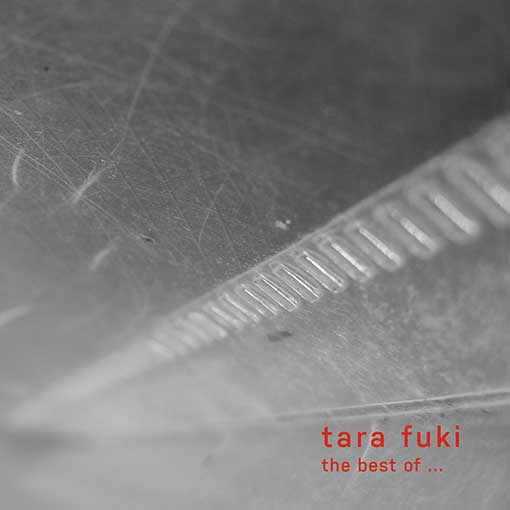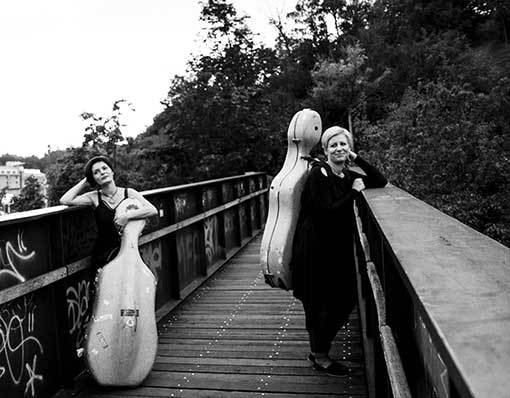Two violoncellos and two vocals - Andrea Konstankiewicz and Dorota Barová began to play together in the Tara Fuki duo fifteen years ago. The Best of... is not only a selection of the best of what they have recorded, but also a briefly repeated journey towards the band in its present form.
Tara Fuki have drawn attention from the very beginning; their unusual make-up has contributed to it – the sound of two tenor instruments and two female voices has a charm of its own. The music has not hidden its link to alternative music, jazz and also folklore. The intertwined parts of two violoncellos, live and electronic loops and natural vocals; all this wrapped in an attractive, slightly blurred atmosphere and clear song-like form; the result of which has been extraordinarily open music from the beginning, but also music which tempts one to examine it deeper – the songs of Tara Fuki ask for getting back to them themselves.
 The debut album Piosenki do snu (Little Songs in Dreams) was released in 2001, i. e. one year after the group was founded. It was awarded two genre Anděl prizes for alternative music and as hope of the year. The album Best of... brings a lot of attention to the roots Tara Fuki draw their inspiration from even now. It would be too simplified to say that nothing has changed since, which is not true. The changes have been gentle and inconspicuous, no radical turns; each recorded album has represented a slight shift; be it in the atmosphere, using studio options, electronics or guests. From this perspective, Best of... is valuable also for those who have all the albums released so far if they are interested in the journey the band has made in these fifteen years. Moreover, it is a journey through the perspective of Andrea Konstankiewicz and Dorota Barová as the selection dramaturgy was their doing.
The debut album Piosenki do snu (Little Songs in Dreams) was released in 2001, i. e. one year after the group was founded. It was awarded two genre Anděl prizes for alternative music and as hope of the year. The album Best of... brings a lot of attention to the roots Tara Fuki draw their inspiration from even now. It would be too simplified to say that nothing has changed since, which is not true. The changes have been gentle and inconspicuous, no radical turns; each recorded album has represented a slight shift; be it in the atmosphere, using studio options, electronics or guests. From this perspective, Best of... is valuable also for those who have all the albums released so far if they are interested in the journey the band has made in these fifteen years. Moreover, it is a journey through the perspective of Andrea Konstankiewicz and Dorota Barová as the selection dramaturgy was their doing.
The selection is available in several formats; its electronic quality varies, on CD and also two vinyl. The last option is the most prestigious although, unlike the previous ones, there is only one extra song. This one piece called Dopis (Letter) balances the number of included songs between the previously mentioned first album and the last album Winna – from each album five songs are included. Although it may be mere coincidence but the feeling of clearly defined boundaries of beginning and end of the fifteen-year long creative phase is – once again discreetly and non-portentously – revived.
Compositions from the individual albums are arranged chronologically on the albums and they create five sound worlds which are easy to recognize. Even without looking into the booklet or the player, the transitions from one album to another are evident. However, everything comes from a solid base, which really doesn’t change much and it even surprises how the seemingly limiting cast is stimulating. The ingenuity clearly cannot hide even behind the most modest potential.
The opening Piosenki do snu are the rawest on all the albums. In reality, there are only two violoncellos and two vocals; retrospectively the listener could assume that it is a well recorded demo which will be further processed. However, it is mainly a clear warning about the fact that Tara Fuki do not need more. If they do something extra, they do not do it because they must, but because they want to. In the title piece of the following album Kapka (Droplet) (2003) samples of Mario Buzzi can be heard; the haze of the studio hall, it is as if there came a little intoxication by the studio capabilities after the previous rawness.
The song Lej, Lej, Lej from the album Auris (2007) starts with a guitar and points out the number of guests who participated in the recording, including the jazz quintet Vertigo. For the chamber conditions of Tara Fuki it was almost a large band project, the nature of their music somehow vanishes beyond the rich arrangements, the important recognition role belongs to the voices. With the passing of time it seems that the use of percussion instruments was most problematic. In the album Sens (2010), only some members of Vertigo appeared as guests, meaning that the two violoncellos take the leading role once again. Last year’s album Winna enters with long vocal passage with the use of loops. In general it is a return to the roots, although only a bit more sophisticated on the sound and arrangement part.
The selection ends with the piece V rytmu s deštěm (In the rhythm of rain) – it has never been released before and it is the only one which is sung in Czech. The listener will remember how Polish influenced the sound of Tara Fuki and also the fact that he does not have everything, even though he owns all the Tara Fuki recordings. There is still top-quality material left which makes it worth visiting a concert.
Tara Fuki: The Best of… (Andrea Konstankiewicz and Dorota Barová). Indies Scope 2015, 20 pieces, total footage: 80 min.
































No comment added yet..